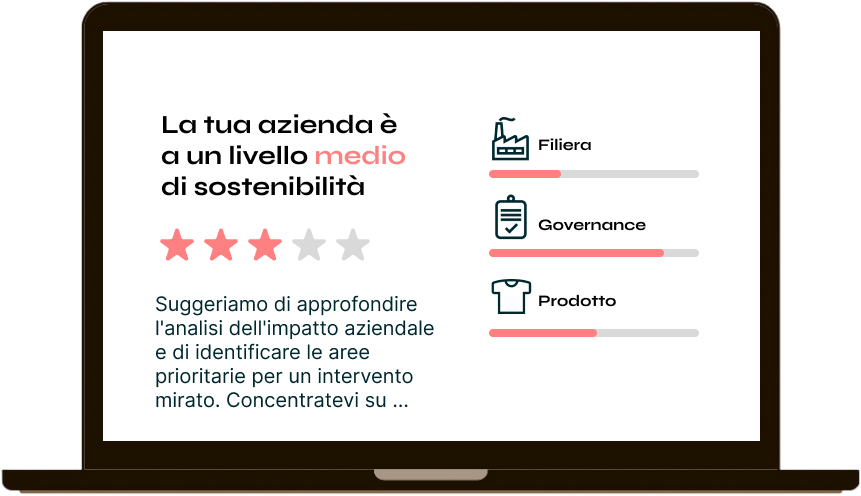Assolombarda event: from the product to the supply chain for sustainable fashion
FASHION AND SUSTAINABILITY – From the product to the supply chain for sustainable fashion
Cikis participated as a speaker at the second out of the 3 live events of Fashion and Sustainability, organized by Assolombarda, on December 9th.
This event focused on product and supply chain and in particular on how to design and manufacture products that have a documented content of sustainability and their impact on the supply chain.
The first part discussed communication as a tool to involve suppliers and partners, the product life cycle and manufacturing processes, end-of-life planning and the role of retail for sustainable fashion.
The second part talked about the choice of input materials, the environmental and social impacts in the value chain, how to create a risk-based approach on human rights and the environment and finally the drivers of sustainability and how they impact in terms of risk on providers.
Rossella Sobrero from Koinètica, began the event by introducing the product and supply chain theme.
“We must increasingly manage the supply chain in a sustainable way to reduce waste, to avoid risks and to improve our reputation with a view to competitiveness. The market is demanding more and more sustainability. Risk assessment is especially important for large companies that have many suppliers, who need to be educated to set high corporate standards.
A good rule is to always share the improvement objectives to be achieved with suppliers. It is very serious to put your reputation at risk. For this reason it is important to equip oneself with tools such as the environmental policy, the code of conduct and the social report, in order to correctly communicate one’s commitment and strengthen one’s image. “
Rossella Sobrero then explained the importance of the supply chain given that sustainable procurement helps build solid and lasting relationships with suppliers.
Improving environmental and social performance becomes an important part of the process of a company that believes in sustainability. Good supply chain management can bring a competitive advantage for the company and allows you to extend communication and reporting of performance throughout the supply chain beyond its own production plants.
Aurora Magni, prof. at LIUC Università Cattaneo, described the procedures for designing a sustainable product.
This is now a fundamental issue given that 80% of the environmental impact exerted by products and services is determined at the project stage; today the fashion sector is mature enough to see sustainability at 360 degrees.
We discussed the relationship between Design and the circular economy and some possible solutions to reduce waste, to extend the life of the asset, to design for reuse / recycling and to produce only “what is needed when needed and maybe where needed”, rethinking the relocation. All this can be facilitated by the use of technologies that can optimize processes and reduce waste.
Aurora Magni then concluded by focusing on the important role that Retail has in sustainability: from the environment, furnishings / fittings to packaging.
Serena Moro, Head of Sustainability at Cikis, spoke about the importance of understanding perspectives and challenges of sustainability along the supply chain, with a focus on the choice of incoming materials and the environmental and social impacts in the value chain.
It is important to talk about it because according to McKinsey’s Fashion on Climate 2020 report, compared to the results already achieved, the fashion sector will have to reduce emissions by an additional 1.7 billion tons to stay within the limit of +1.5 degrees in 2030.
It is therefore necessary not only to continue but also to intensify the activities to reduce emissions, in particular in the operations of the supply chain, where 61% of the reduction opportunities are; 21% in the internal operations of the brands and 18% in the use phase.
The activities with the possibility of reduction were therefore mentioned, in order of potential: processing of materials, production of materials, manufacturing and processing waste.
Serena Moro then described two case studies of brands followed by Cikis: a total look made in Italy women’s clothing brand with the need to tackle the issue of sustainability without a specific goal yet, and a brand of accessories for men and women by Cappelli with the need to avoid greenwashing.
The ways in which companies can act concretely, the typical needs and the elements to enhance themselves were therefore addressed. Some examples were: understanding the difference between natural and sustainable, raw material and processing; have a clear vision on the positioning of the company and in particular on the role of sustainability in the corporate strategy and use certifications correctly.
Finally, Martina Rogato, Cikis sustainability consultant and advisory, spoke about the close relationship between sustainability and the supply chain.
Sustainability cannot be separated from knowledge of the supply chain and related individual impacts.
The drivers of sustainability were discussed, including: scarce resources and threats to the planet; the reputation and rise of the “ethical” consumer; the critical shareholder who is becoming an important accelerator for sustainability.
Finally, we talked about the change that the legislation is having in relation to sustainability, passing from a voluntary approach to a mandatory approach with a focus on supply chain and traceability.
Conclusions
In this second live event we discussed the issue of sustainability in detail, with a focus on product and supply chain.
The next and last live event will be held on Friday 18 December 2020 from 2.30 pm and will focus on the future of sustainable fashion.
We will talk about how to understand the impact of new sustainable innovation trends in the fashion industry and the role of sustainability communication.
We are waiting for you!
Get articles like this and the latest updates on sustainable fashion automatically!
